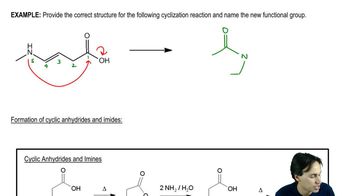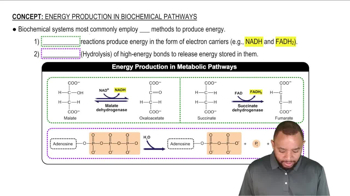Here are the essential concepts you must grasp in order to answer the question correctly.
Alkene Reactivity
Alkenes are hydrocarbons that contain at least one carbon-carbon double bond, making them reactive intermediates in organic synthesis. Their reactivity allows them to undergo various reactions, such as addition reactions, which can be utilized to form more complex structures. Understanding the reactivity of alkenes is crucial for determining which alkene can be transformed into the desired product.
Recommended video:
Alkene Metathesis Concept 1
Cyclization Reactions
Cyclization reactions involve the formation of cyclic compounds from acyclic precursors. In the case of synthesizing ethylcyclopentane, a key step would be the cyclization of a suitable alkene to form a five-membered ring. Recognizing the conditions and mechanisms that favor cyclization is essential for successfully constructing cyclic structures in organic synthesis.
Recommended video:
Synthetic Pathways
Synthetic pathways refer to the series of chemical reactions and transformations used to convert starting materials into a target compound. Identifying the correct synthetic pathway involves understanding the functional groups present, the types of reactions that can be performed, and the order of steps needed to achieve the desired product. This knowledge is vital for planning the synthesis of ethylcyclopentane from an appropriate alkene.
Recommended video:
Energy Production In Biochemical Pathways Concept 1
 Verified step by step guidance
Verified step by step guidance Verified video answer for a similar problem:
Verified video answer for a similar problem:



 0:48m
0:48m